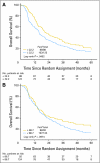Quality of life supersedes the classic prognosticators for long-term survival in locally advanced non-small-cell lung cancer: an analysis of RTOG 9801
- PMID: 19858383
- PMCID: PMC2793002
- DOI: 10.1200/JCO.2009.23.7420
Quality of life supersedes the classic prognosticators for long-term survival in locally advanced non-small-cell lung cancer: an analysis of RTOG 9801
Abstract
Purpose: To determine the added value of quality of life (QOL) as a prognostic factor for overall survival (OS) in patients with locally advanced non-small-cell lung cancer (NSCLC) treated on Radiation Therapy Oncology Group RTOG-9801.
Patients and methods: Two hundred forty-three patients with stage II/IIIAB NSCLC received induction paclitaxel and carboplatin (PC) and then concurrent weekly PC and hyperfractionated radiation (to 69.6 Gy). Patients were randomly assigned to amifostine (AM) or no AM during chemoradiotherapy. The following pretreatment factors were analyzed as prognostic factors for OS: Karnofsky performance status, stage, sex, age, race, marital status, histology, tumor location, hemoglobin, tobacco use, treatment arm (AM v no AM) and QOL scores (European Organisation for Research and Treatment of Cancer Quality of Life Questionnaire C30 [QLQ-C30] and Lung Cancer 13 [LC-13]). A multivariate (MVA) Cox proportional hazards model was performed using a backwards selection process.
Results: Of the 239 analyzable patients, 91% had a baseline global QOL score. Median follow-up time was 59 months for patients still alive and 17 months for all patients. Median baseline QLQ-C30 global QOL score was 66.7 on both treatment arms. Whether the global QOL score was treated as a dichotomized variable (based on the median score) or a continuous variable, all other variables fell out of the MVA for OS. Patients with a global QOL score less than 66.7 had an approximately 70% higher rate of death than patients with scores > or = 66.7 (P = .004). A 10-point higher baseline global QOL score corresponded to a decrease in the hazard of death by approximately 10% (P = .004). The other independent QOL predictors for OS were the QLQ-C30 physical functioning (P = .011) and LC-13 dyspnea scores (P = .012).
Conclusion: In this analysis, baseline global QOL score replaced known prognostic factors as the sole predictor of long-term OS for patients with locally advanced NSCLC.
Conflict of interest statement
Authors' disclosures of potential conflicts of interest and author contributions are found at the end of this article.
Figures


References
-
- Siddiqui F, Kachnic LA, Movsas B. Quality-of-life outcomes in oncology. Hematol Oncol Clin North Am. 2006;20:165–185. - PubMed
-
- Coates A, Porzsolt F, Osoba D. Quality of life in oncology practice: Prognostic value of EORTC QLQ-C30 scores in patients with advanced malignancy. Eur J Cancer. 1997;33:1025–1030. - PubMed
-
- Maisey NR, Norman A, Watson M, et al. Baseline quality of life predicts survival in patients with advanced colorectal cancer. Eur J Cancer. 2002;38:1351–1357. - PubMed
-
- Gotay CC, Kawamoto CT, Bottomley A, et al. The prognostic significance of patient-reported outcomes in cancer clinical trials. J Clin Oncol. 2008;26:1355–1363. - PubMed
-
- Dancey J, Zee B, Osoba D, et al. Quality of life scores: An independent prognostic variable in a general population of cancer patients receiving chemotherapy. Qual Life Res. 1997;6:151–158. - PubMed
Publication types
MeSH terms
Substances
Grants and funding
LinkOut - more resources
Full Text Sources
Medical

